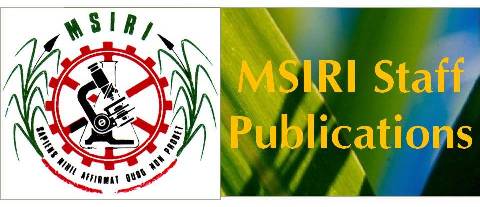Seed potato production in the Lowland tropics: the Mauritian experience
| MSI99P0075 | |
| Autrey, L. J. C. Ferré, P. Dookun, A. Saumtally, S. | |
| Seed potato production in the Lowland tropics: the Mauritian experience | |
| Govinden, N., Julien, M. H. R., Hunt, G. L. T. Autrey, L. J. C. (eds)., Production, Post-harvest technology and utilization of potato in the warm tropics - Proceedings of a workshop held in Réduit, Mauritius, 23-27 July 1990 | |
| Book chapter | |
| 1991 | |
| p. 29-38 | |
| Réduit, Mauritius Sugar Industry Research Institute, MU | |
| En | |
| En Fr | |
| Seed potato production was initiated in Mauritius in 1974 after successful pilot projects. The scheme consisted initially of bulking of certified seed stocks of variety Up to date and on a much smaller scale of propagation of Elite stocks of European varieties Apollo, Resy, Eba, Cardinal, Désirée, Regale and Spunta. Significant success was achieved and some 864 tonnes representing 50 per cent of total seed requirements were produced in 1978. Major setbacks were induced to the scheme by high levels of common scab in Up to date, Désirée and Eba, internal brown fleck in Apollo, potato virus Y in Up to date and Cardinal while long periods of cold storage induced physiological problems especially in Up to date. Production dwindled to 192 tonnes in 1982. Adoption of new varieties with better disease characteristics and storage ability, new sources of basic seed stocks especially for Up to date, together with novel technology namely ELISA, ISEM to detect pathogens, especially viruses, performance tests duplicated in the glasshouse and in the field on a large number of samples, allowed the scheme to be successful. In 1986, 1987, 1988 and 1989 production of seed of varieties Spunta, Lola, Exodus, Sahel, Up to date, Geograph, BR 63-76 and BR 69-84 totalled 1338, 1362, 1609 and 1737 tonnes respectively. The setting up of a tissue culture laboratory and two solar domes have given further impetus to the scheme with the rapid micropropagation of minute stocks of plantlets and mini tubers imported from the International Potato Centre and other sources. Seed stocks produced in 1989 will supply 75 per cent of all seed requirements in 1990, which amounts to 2,350 tonnes. The local scheme aims ultimately at satisfying 90 per cent of all seed requirements, with possibility of exportation to surrounding countries. Apart from lowering costs of production, the local scheme has allowed cultivation on a large scale of high quality stocks of European varieties which otherwise would not have been imported owing to the high cost of seed and freight and hazards associated with long distance transport of perishables. Most growers have expressed satisfaction and confidence in the local seed which has been found free from degenerescent diseases, especially PVY and potato leaf roll, since 1983. | |
| POTATOES SEEDS DISEASES PESTS VARIETIES STORAGE MICROPROPAGATION | |
| MAURITIUS | |
| Potatoes: Seed science | |
| Seed production | |
| 1991-12-10 | |
| En | |
| Mauritius Sugar Industry Research Institute | |
| LIB | |
| CAT | |
| PATH |
